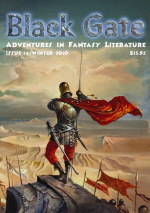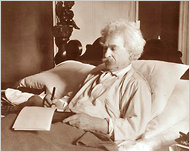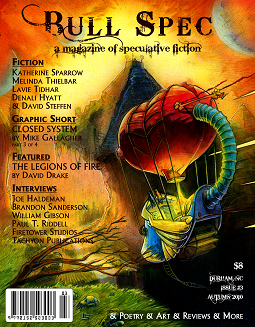 The woman held in one hand a small cigarette-package-sized radio, its antenna quivering. From this sprang tiny copper wires which ended in a dainty cone plugged into her right ear. There she was, oblivious to man and dog, listening to far winds and whispers and soap-opera cries, sleep-walking, helped up and down curbs by a husband who might just as well not have been there. This was not fiction.
The woman held in one hand a small cigarette-package-sized radio, its antenna quivering. From this sprang tiny copper wires which ended in a dainty cone plugged into her right ear. There she was, oblivious to man and dog, listening to far winds and whispers and soap-opera cries, sleep-walking, helped up and down curbs by a husband who might just as well not have been there. This was not fiction.
This was Ray Bradbury, quoted in Kingsley Amis’s New Maps of Hell, in observing that the “seashells” he had made up for people to listen pressed against their ear had actually been invented with the transistor radio (a very, very, very primitive iPod, for you youngsters). Ray’s point was that the seashells transported people into artificial environments that imperiled human interaction.
This quote appears on the back of my Ballentine Books 1962 paperback edition of Fahrenheit 451 (purchased when I was in sixth grade for the enormous sum of 50 cents). As you should know, the novel is an indictment of a media-obsessed dystopia that burns books so people aren’t exposed to disturbing ideas and can be kept “happy” with mindless entertainment. This was written in the early 1950s, and while Bradbury may not have had the details right (and that’s never been his interest), he certainly anticipated our Internet Age (which Ray has described as a “waste of time”).
While the transistor radio may have been the first step, the real giant leap in which we’ve beomce technological islands unto ourselves was the invention of the portable cassette player, the Sony Walkman, in 1979. With the transistor radio, you listened to what someone was playing for you, usually for the purpose of selling you something. With this clunky piece of machinery, you could choose what you wanted to listen to, wherever you wanted to listen to it. Not quite as passive as today’s MP3 player as you actually had to load into it a a cassette tape, the contents of which you may actually have put some effort into creating as your own personal playlist, without the assistance of a computerized “genius” that’s supposed to know your tastes for you.
The Walkman officially no longer roams the Earth. Sony has announced that production has shut down. Another era has passed. Alas, Bradbury’s vision of a witless America hasn’t.
 Just arrived in the mail is Interzone‘s concluding issue of 2010 featuring the cover artwork of Warwick
Just arrived in the mail is Interzone‘s concluding issue of 2010 featuring the cover artwork of Warwick  Fraser-Coombe; the combined pieces of the six issues this past year form a complete work called “Playground (Hide and Seek).”
Fraser-Coombe; the combined pieces of the six issues this past year form a complete work called “Playground (Hide and Seek).” 

 There’s an
There’s an  On the heels of
On the heels of  So in this Kindelized, iPadded and Nooked age of reading trivialized by celebrity tell-it-alls, self-help elevation and political numbwits (though excerpts from the book demonstrate that things were just as bad in Twain’s era as ours, except ours is perhaps a little worse thanks to the Internet and cable TV), Mark Twain’s physical opus is this season’s Christmas holiday hit, surpassing even that of Keith Richards.
So in this Kindelized, iPadded and Nooked age of reading trivialized by celebrity tell-it-alls, self-help elevation and political numbwits (though excerpts from the book demonstrate that things were just as bad in Twain’s era as ours, except ours is perhaps a little worse thanks to the Internet and cable TV), Mark Twain’s physical opus is this season’s Christmas holiday hit, surpassing even that of Keith Richards. While other magazines are dying (and then, a la
While other magazines are dying (and then, a la  The
The  The woman held in one hand a small cigarette-package-sized radio, its antenna quivering. From this sprang tiny copper wires which ended in a dainty cone plugged into her right ear. There she was, oblivious to man and dog, listening to far winds and whispers and soap-opera cries, sleep-walking, helped up and down curbs by a husband who might just as well not have been there. This was not fiction.
The woman held in one hand a small cigarette-package-sized radio, its antenna quivering. From this sprang tiny copper wires which ended in a dainty cone plugged into her right ear. There she was, oblivious to man and dog, listening to far winds and whispers and soap-opera cries, sleep-walking, helped up and down curbs by a husband who might just as well not have been there. This was not fiction. Last week I was in Seattle and Portland, where I made pilgrimages to venues possible interest to readers here. One was Powell’s Books, which claims to be the largest independent bookstore of both used and new books in the nation. It’s an amazing place, with floors of books in a range of almost every conceivable category that would put any Barnes and Noble “superbookstore” to shame even in its heyday. Needless to say, the science fiction and fantasy aisle alone is something you could easily browse for an hour or two.
Last week I was in Seattle and Portland, where I made pilgrimages to venues possible interest to readers here. One was Powell’s Books, which claims to be the largest independent bookstore of both used and new books in the nation. It’s an amazing place, with floors of books in a range of almost every conceivable category that would put any Barnes and Noble “superbookstore” to shame even in its heyday. Needless to say, the science fiction and fantasy aisle alone is something you could easily browse for an hour or two.